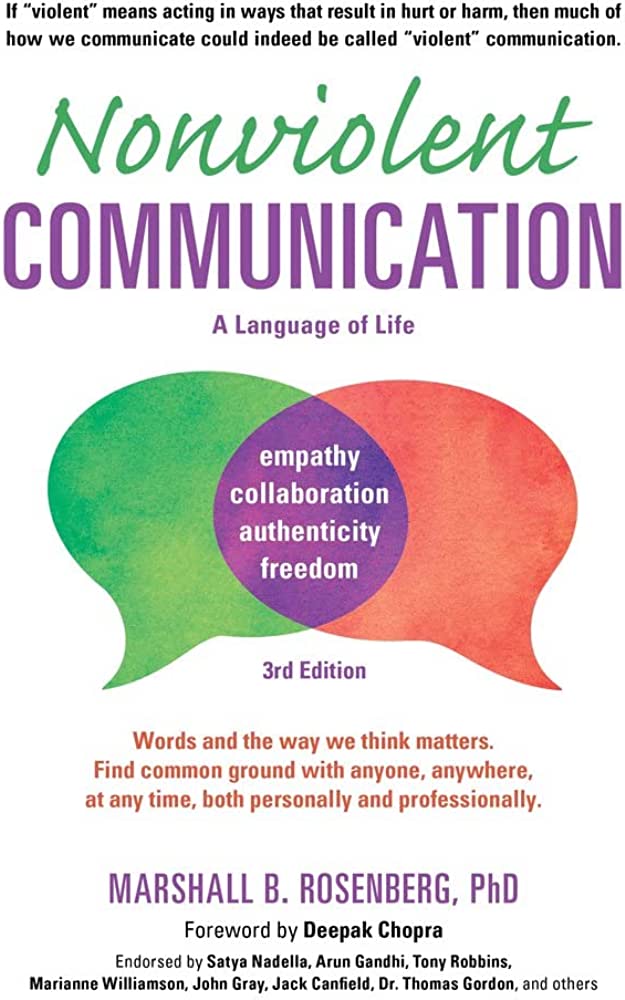
“Nonviolent Communication: A Language of Life: Life-Changing Tools for Healthy Relationships” by Marshall B. Rosenberg, Ph.D., is a transformative book that offers a practical framework for effective communication and conflict resolution. It introduces readers to the concept of Nonviolent Communication (NVC), a compassionate approach to expressing ourselves and understanding others. Let’s explore three key insights from the book:
- Understanding the Four Components of Nonviolent Communication. Nonviolent Communication is based on four core components: observations, feelings, needs, and requests. Observations involve objectively describing a situation without judgment or evaluation. Feelings represent the emotions that arise in response to those observations. Needs are the underlying values, desires, or motivations driving our feelings. Lastly, requests are specific, doable actions we can make to address our needs.
Rosenberg emphasizes the importance of distinguishing between these components and avoiding mixing them up with interpretations, judgments, or demands. By clearly expressing our observations, feelings, needs, and requests, we create a space for compassionate understanding and dialogue, fostering connection and empathy.
- Developing Empathy and Connection through NVC. Nonviolent Communication places great emphasis on empathy—the ability to deeply understand and connect with others’ experiences and emotions. The book provides practical guidance on how to cultivate empathy by actively listening to others, reflecting back their feelings and needs, and expressing sincere curiosity about their experiences.
By engaging in empathetic conversations, we can build trust, foster understanding, and resolve conflicts peacefully. NVC encourages us to approach communication as a joint problem-solving process, where both parties’ needs are taken into account and mutually satisfying solutions are sought.
- Transforming Conflict with Nonviolent Communication. Conflict is an inevitable part of human interactions. However, “Nonviolent Communication” offers a new perspective on conflict, presenting it as an opportunity for connection, understanding, and growth. The book outlines practical steps to transform conflicts using NVC principles.
Instead of resorting to blame, criticism, or aggression, NVC encourages us to adopt a non-judgmental stance and focus on the needs underlying the conflicting positions. By actively listening, empathizing, and expressing ourselves honestly and respectfully, we can create a safe space for dialogue and collaborative problem-solving.
Rosenberg provides numerous examples, exercises, and case studies throughout the book to illustrate the application of NVC in various contexts, including personal relationships, workplaces, and communities. By practicing the principles of Nonviolent Communication, we can develop more meaningful connections, resolve conflicts peacefully, and contribute to creating a compassionate and harmonious world.
“Nonviolent Communication” is an essential read for anyone seeking to improve their communication skills, build empathy, and foster peaceful resolutions in their personal and professional lives. By embracing the principles of NVC, we can create a more compassionate and understanding society.
To delve deeper into the concepts and practical applications of Nonviolent Communication, I highly recommend reading the original book by Marshall B. Rosenberg. It offers a comprehensive and insightful guide that can transform the way we communicate and relate to others.
“Nonviolent Communication” is available for purchase on platforms such as Amazon.

Elevate your reading routine with Kindle Scribe – the first Kindle for reading, writing, journaling and sketching. The portable library that grants you instant access to millions of books at your fingertips.
Top 5 Quotes from “Nonviolent Communication: A Language of Life: Life-Changing Tools for Healthy Relationships”:
- “When we give and receive with an open heart, unattached to outcome, then the more we give, the more we have available to give.”
- “Empathy is a respectful understanding of what others are experiencing.”
- “Honesty expressed without empathy is brutality.”
- “What others do may be a stimulus of our feelings, but not the cause.”
- “The more we practice empathic self-connection, the easier it is to maintain our inner peace and to extend empathy to others, even in the most difficult of circumstances.”
“Nonviolent Communication: A Language of Life: Life-Changing Tools for Healthy Relationships” is an extraordinary masterpiece that illuminates the path to compassionate communication and deep connection. Dr. Marshall B. Rosenberg’s wisdom and expertise permeate every page, offering readers transformative tools and insights. This book has the power to revolutionize relationships, fostering empathy, understanding, and healing.



